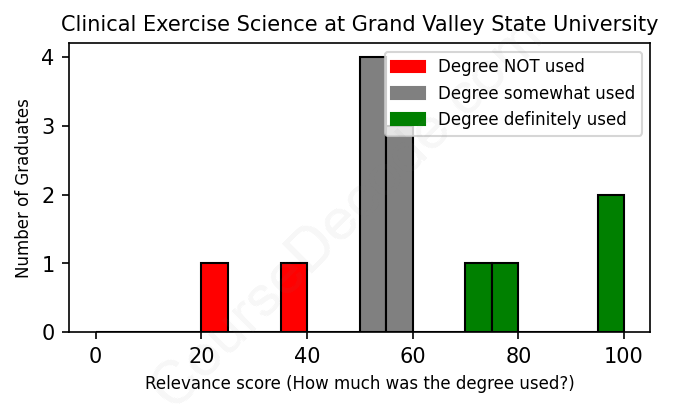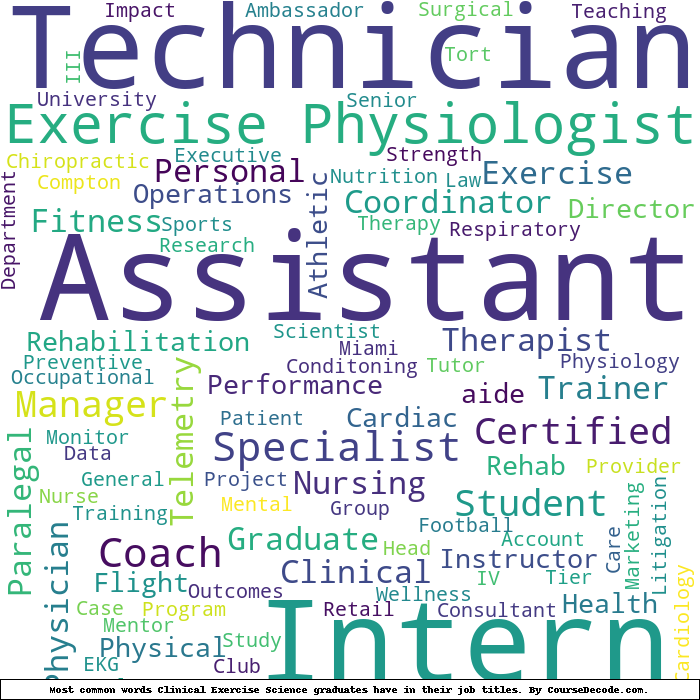
First, some facts. Of the Clinical Exercise Science graduates from Grand Valley State University we've analyzed , here's how many have used (or NOT used) their degree in their career:

These are estimates based on AI analysis of 13 LinkedIn profiles (see below).
The verdict? Below average. Overall, with an average relevance score of 60%, Clinical Exercise Science graduates from Grand Valley State University have a lower likelihood (-7%) of finding work in this field compared to the average graduate across all fields:
And for comparison, here's the chart for all profiles we've looked at across all degrees.
Also, after graduating, 61% of these graduates have pursued further education other than another Bachelor's degree (such as a Masters degree or other), compared to the average across all profiles of 35%. This suggests you may need more than just a Bachelors degree to be competitive as a Clinical Exercise Science graduate.
See the details:
|
Relevance score: 59% We think this person has gone into a career only somewhat relevant to their degree. We think this person has gone into a career only somewhat relevant to their degree.
DEGREE INFOGraduated in 2021 from Grand Valley State University with a Bachelors of Science in Clinical Exercise Science. No other secondary education since. JOB HISTORY SINCE GRADUATIONExercise Physiologist Intern Ascension Jun 2021 - Aug 2021 Telemetry Monitor Technician  Michigan Medicine Aug 2021 - May 2022 Exercise Physiologist  Ascension Feb 2022 - Aug 2022 Clinical Research Coordinator  Henry Ford Health Aug 2022 - Present ABOUTClinical experience at University of Michigan and Ascension St. John Hospitals. Previous Student Technician at IT Services through Grand Valley State University.Bachelor's of Science in Clinical Exercise Science from Grand Valley State University in April, 2021.CPR, BLS, ACLS, and First Aid Certified.Certified in Microsoft Office. |
The top 10 most common jobs done by the graduates we've analyzed (ranked most common to least) are:
When we look at the jobs held by graduates of Clinical Exercise Science from Grand Valley State University, a mix of relevant and irrelevant roles is evident. The most common and directly related jobs include positions like Exercise Physiologist and Fitness Instructor, where individuals utilize their skills in exercise assessment, rehabilitation, and wellness promotion. These roles are crucial as they directly align with the knowledge gained during their studies, making them a significant portion of the employment landscape for these graduates.
However, many graduates have ventured into fields that don't utilize their Clinical Exercise Science background at all. Roles such as Project Manager, Paralegal, and Retail Account Specialist are common but don't really draw on the skills developed through their degree. It's a mixed bag, really: while there are solid careers directly linked to clinical exercise, a good number of graduates find themselves in positions that are pretty far removed from the science of exercise. So, while some graduates are definitely thriving in relevant positions, others are exploring paths that don't leverage their degrees as effectively as they might have hoped.
Here is a visual representation of the most common words in job titles for Clinical Exercise Science graduates (this is across all Clinical Exercise Science graduates we've analyzed, not just those who went to Grand Valley State University):

Graduates from Grand Valley State University with a degree in Clinical Exercise Science often start their careers in roles that are quite aligned with their studies, such as exercise physiologists, rehabilitation technicians, and fitness instructors. For many, their first job is often related to exercise physiology or rehabilitation, like working as an intern in hospitals or clinics, or as exercise specialists in rehabilitation centers. This initial experience typically gives them practical, hands-on exposure to the nuances of patient care and exercise-related health interventions. As they gain experience and potentially continue their education, many move into more advanced roles in healthcare, such as physician assistants or occupational therapists, further solidifying their career paths within the health sciences. However, there are noted cases of graduates veering off into unrelated fields, like law or environmental sciences, suggesting some might not find their ideal roles within the realm of Clinical Exercise Science right away.
Looking five to ten years down the road, it seems that many of these graduates do find themselves in professional positions that are relevant to their training. For example, several have progressed to roles like cardiac rehabilitation, clinical research coordination, or advanced physical therapy roles, which are closely tied to their academic background. However, not all graduates follow this trajectory; some end up in roles that, while they may have good job security, are less related to their degree, indicating that the career paths for Clinical Exercise Science majors can vary greatly. Overall, while the early signs are promising in terms of career alignment, it’s clear that some individuals may find themselves diverted into other fields over time. This serves as a reminder that while your degree can set the stage, the path you take may not always be a straight line toward what you studied for.
Honestly, a Bachelor’s degree in Clinical Exercise Science can be a bit of a mixed bag, but overall, it’s pretty manageable if you’re motivated and interested in the subject. At Grand Valley State University, like at many schools, you’ll probably dive into some anatomy, physiology, and exercise prescription stuff, which can be challenging if you’re not into science. But if you’re passionate about fitness and helping others, that interest can make the harder classes feel less daunting. There will definitely be some tough moments with exams and labs, but with good time management and a willingness to learn, you’ll likely find it’s not any harder than a lot of other degree programs out there. Just stay engaged and seek help when you need it, and you should be able to cruise through!
Most commonly, in the LinkedIn profiles we've looked at, it takes people 4 years to finish a Bachelor degree in Clinical Exercise Science.
Looking at the career paths of these graduates from Grand Valley State University, it seems like most have found jobs that could offer decent pay, especially in the healthcare and wellness fields, which tend to pay relatively well. For example, the Occupational Therapist and the Physician Assistants are likely earning solid salaries compared to many entry-level jobs. However, some like the interns and fitness instructors seem to be starting from a lower pay scale and might struggle a bit at first. Overall, it appears that with a degree in Clinical Exercise Science, they should eventually be able to make a comfortable living, especially if they keep progressing in their careers and move into roles like managers or specialized practitioners. So, while they might not be rolling in it right away, they've got the potential to make decent money down the line!
Here is a visual representation of the most common words seen in the "about" section of LinkedIn profiles who have a Bachelor degree in Clinical Exercise Science (this is across all Clinical Exercise Science graduates we've analyzed, not just those who went to Grand Valley State University). This may or may not be useful:

Here are all colleges offering a Bachelor degree in Clinical Exercise Science (ordered by the average relevance score of their Clinical Exercise Science graduates, best to worst) where we have analyzed at least 10 of their graduates:
| College | Score | Count |
|---|---|---|
 Grand Valley State University Grand Valley State University
|
60 | 13 |